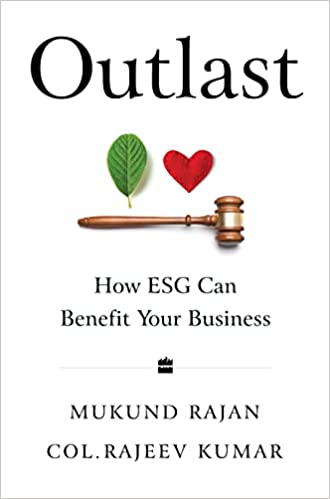Five years ago most Indian business leaders thought that the Environment, Social and Governance (ESG) metrics was only an option; even a pain in the neck. However, the turbulence in the last two years has left these leaders gasping for breath. They are no longer looking around for books or talks to inspire them; instead, they are rushing to seek clarity on how to use the ESG mantra to gain competitive advantage and sustain growth.
Mukund Rajan and Col. Rajeev Kumar’s book Outlast – How ESG Can Benefit Your Business (published by Harper Business late 2021) have given a comprehensive outlook of India’s ESG journey and their wish list of what needs to be done to build greater capacity in the ecosystem.
India may be a decade late and needs to catch up fast to attract global ESG focused funding. Even Indian banks are beginning to demand environmental clearance for projects before funding them. Several case studies in the book will help leaders who have just begun their ESG journey to learn quickly.
It’s apparent today that Sustainability and ESG have forced the rewriting of the enterprise playbook. Reading Outlast could help entrepreneurs, managers, investors, shareholders and bankers ask relevant questions and demand appropriate answers.
Outlast’s focus is corporate India and two-thirds of the book offers a glimpse of how the ecosystem has been unfolding. However, the subtitle of the book ‘How ESG Can Benefit Your Business’ promises a lot more to a no-corporate reader. A start-up entrepreneur or a small business owner would have expected research-based data to show the power of ESG on business outcomes. Tactics and best practices on how to enhance engagement standards, among others. For those looking for innovative financial models, either original, or referenced from Indian and global research, this book will disappoint them.
Fortunately, the choice of books on ESG and related topics such as conscious capitalism, impact investing, responsible business, is huge. Check out this link – https://sustainfi.com/articles/impact/impact-investing-books/.
ESG Activism
The authors have kept the best for the last where they have tried to take a leap from ESG advocacy to ESG activism. Take a peek:
India’s Achilles heel is its low R&D spend – 0.6% of GDP for the last two decades against China’s 2.1% and Western countries around 3%. Healthy spending on research and development is important for preparing the country for transitioning to a greener and cleaner society. Corporate R&D spends too is low in India.
To enhance corporate governance businesses must invest in continuous education of independent directors. There’s also a need for a dedicated ESG committee in the board.
Indian companies need to link ESG performance to executive compensation and reduce the massive difference between a CEO’s compensation and that of the employees.
India has the habit of holding a moral high ground on most global civic and business issues. Yet, its global rankings on most parameters are abysmal. Governance is the weakest link in India’s armour – both State and Corporate. In 2020, India ranked 86th in Transparency International’s Corruption Perceptions Index.
The authors have boldly called out election funding as “the elephant in the room that must be addressed” as it is the ‘fountainhead of big-ticket corruption. Corporate India is a key player in funding all types of elections. “A common reform in many countries in recent decades has been the introduction of a system of public funding of political parties. Corporate India, in its own interest, must consider and pursue…How Indian business leaders navigate the challenge they face may decide the future of free enterprise in India.”
The authors rightly plead India Inc. to demonstrate responsible behavior. They warn “The government already looms large in India and there is a significant and growing threat of that corporate world falling under its shadow if Indian businesses don’t pay more attention to ESG requirements… The unprecedent times we live in call for a more sensitive, aware and responsible leadership within corporate India.”
The authors’ most daring suggestion to corporate India, apart from demonstrating individual examples, is to “embrace integrity pacts and organize a coalition of those willing to fight corruption.”
In the Age of Responsibility, the authors call for a holistic adoption of the ESG mantra to build resilience and long-term success. The ESG journey has just begun in India. Outlast makes for a good guide in this journey.
a
Support Green Journalism
Dear Readers,
Since March 2013, SustainabilityNext (SN) has been educating and exciting thousands of entrepreneurs, executives and graduate students about the power of Sustainability in influencing our future. It’s purpose is to inspire and provoke Indians to move swiftly from awareness to belief to ACTION.
As of December 2021, SN is India’s most read digital magazine on the business of sustainability. It has been covering Green Business, Green Products, Social Entrepreneurship, Green Literature, Green Technology, among others. A youth section was added in 2021.
SN launched India’s first Green Literature Festival (www.greenlitfest.com) in June 2021 to offer a robust platform for readers and writers to hold meaningful conversations.
For SN to grow and stay relevant it needs to transition from a grant and self-funded model to a community-funded and/or institution/corporate-funded model.
Looking forward to your timely and generous support.
Why Support SN – https://sustainabilitynext.in/support/
Subscriber
Supporter
Benefactor
Sponsor
All supporters get two-year subscription to SN. You can Gift Subscription to your colleagues/friends/family.
For sponsorships and advertising please contact
Benedict Paramanand
Publisher & Editor
benedict99@gmail.com
a










